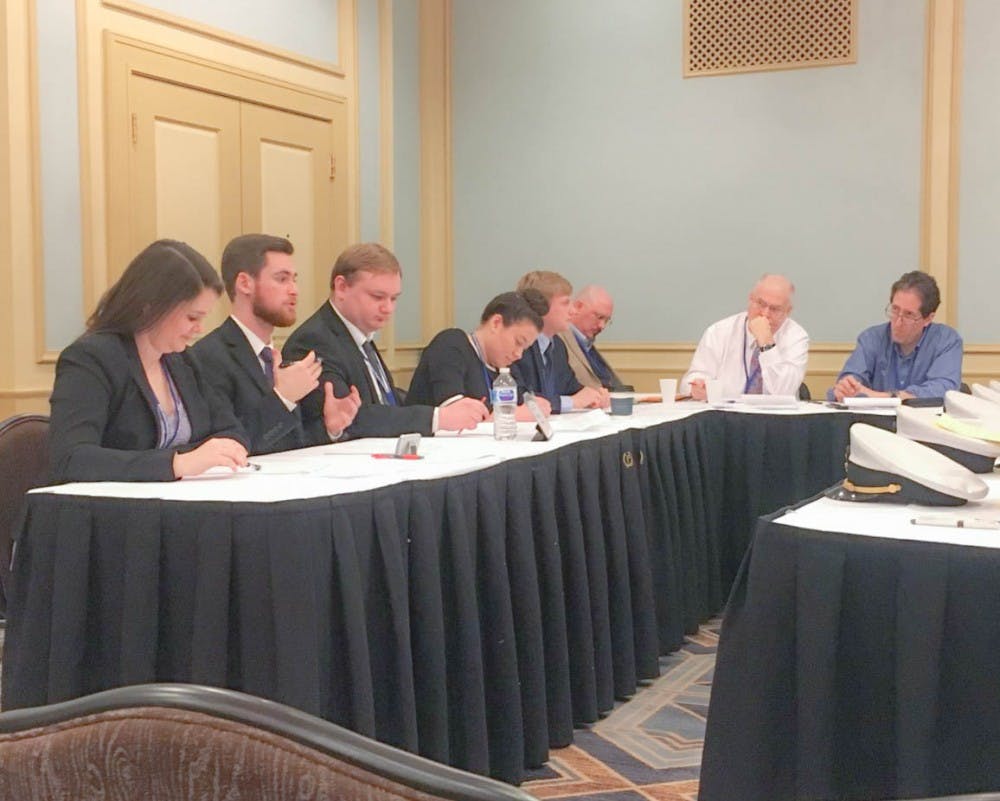Abigail Roberts | The Echo
Each year, Taylor sends two to three teams of five to Ethics Bowl's regional competition. Out of 28 teams, this year, Taylor placed third and sixth. All top five teams move on to nationals, held in Baltimore, Maryland next spring.
Seniors Josie Luptak and Caleb Holleman as team captains have competed in this intimidating space dozens of times before, but for the five new freshmen on their team, this was their first time in front of a panel of judges.
Taylor is officially the first university in history to qualify for nationals nine times in a row. According to Jim Spiegel, professor of philosophy and religion and advisor to the Ethics Bowl team, 80 percent of the years he has been working with Ethics Bowl Taylor has qualified and moved on to nationals.
40 teams are in total selected for nationals. Consistent contestants include Harvard, Yale, multiple military academies and Taylor, a group of students from the middle of nowhere, according to Luptak.
"People say, 'Oh, you're the team from Taylor,'" Luptak said. "We have a huge reputation and are the only team that has placed nine years in a row. The fact that we are there every year shows we are dedicated and really good."
Each round both at regionals and nationals has a similar general format. Five students, known as "starters," make up the team.
The judges present a case, such as drone usage or the argument of whether convicted felons should vote or not. The team has two minutes to prepare their response. From memory the five starters evaluate their position and coordinate who is speaking on each subject. They then have seven minutes to give their case presentation.
Holleman appreciates the conversational style of Ethics Bowl in comparison to the confrontational aspect of debates.
"Ethics Bowl is supposed to be a conversation between the two teams," Holleman said. "I like that you don't have to choose a certain side and you don't have to argue for things you don't care about."
The opposing team has five minutes to respond, either rebutting or adding to the previous team's argument. After responding to the rebuttal, in the final 10 minutes, the original team is asked questions by the judge's panel.
Teams present their cases, not just as an argument based on facts or evidence, but primarily on ethical and philosophical theories such as utility and autonomy.
"This is one of the ways I've learned the most about God while at Taylor," Luptak said. "I can't use the Bible in my cases; I have to come to these decisions with secular knowledge, but I can always make cases that align with the Bible. It's like learning how to do apologetics while leading with my faith."
Months before the competition, 15 topics that could be discussed are posted online to research beforehand. Team members choose which three of the five are of most interest to each of them, assigning three to each starter.
The additional six Ethics Bowl members assist in additional research and support.
"It's a lot of work," Luptak said. "And it's almost like invisible work, only 12 cases are chosen at nationals so there are three cases you've prepared for you never get called on. That is super tough."
Holleman would describe it as a labor of love, especially this year as he and upperclassmen have been able to assume for mentor, teacher-like roles.
This year's team is unique with freshman making up almost 50 percent of its members.
"The freshmen have done a wonderful job contributing," Spiegel said. "With five of the 11 team members being freshmen, they've played a bigger role than ever. I'm very proud of them."
Having won nationals in 2015 and coming close in 2013, Taylor has a good chance of possibly winning this year.
Luptak agreed that this is the best team she's been on, the most hard-working and unified out of her three years with Ethics Bowl.
"I believe we have as talented a team as we've ever had going to nationals," Spiegel said. "So our prospects are as strong as one could hope for, but the wild card is the judging, which is often unpredictable."





